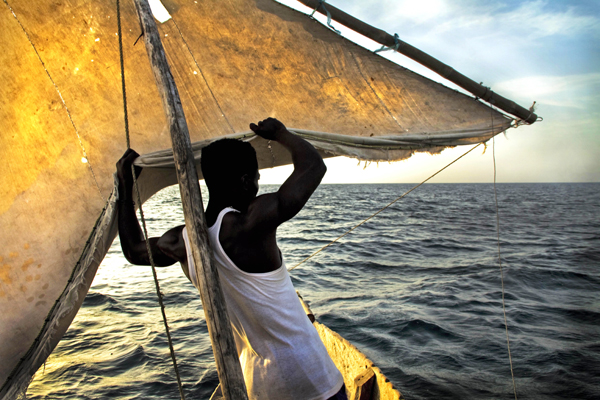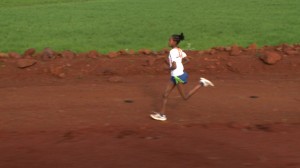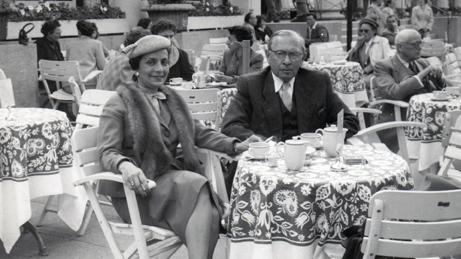
Juma Lonya Mwapitu in WAVUMBA (Jeroen van Velzen)
Documentaries about athletes and ruggedly macho jobs won awards at the 2012 Tribeca Film Festival and were also popular with audiences. In Wavumba (“they who smell of fish” in Swahili), Best New Documentary Director Jeroen van Velzen finds the spiritual aspects of traditional shark hunting off the coast of Kenya through shamans and the eyes and weathered hands of the old fisherman Masoud, who tries to pass on patience and appreciation for his ancestors to the younger, restless (and resentful) generation. Returning to the sites of beloved stories from his lonely youth, Velzen, who traveled four days from Lake Malawi in Africa to attend the festival, goes just beyond a nostalgic National Geographic-type travelogue to have us believe that we, too, can see what haunts the waters off the sacred island of Mpunguti.
The winner of the first audience award for best documentary, Tom Putnam and Brenna Sanchez’s BURN, follows a year-in-the-life of the Detroit Fire Department, the busiest in the nation. Its new chief takes a crash course in managing a drastically declining city with budget cuts and the consequences of a radical “let it burn” policy for the plague of vacant structures. Firefighters facing retirement and serious injury emotionally personalize the wider impact of the financial crisis on public employees and hard-hit cities. With Denis Leary on board as executive producer, the premiere generated proceeds for the Leary Firefighters Foundation to buy the gear that the Detroit crews sadly need.
The economic downturn, craggy fishermen, an ambitious entrepreneur, and stubborn politicians suspensefully figure in David Redmon and Ashley Sabin’s timely Downeast, with women workers at a closed sardine cannery-turned-lobster processing plant caught in the middle in Prospect Harbor, ME. This sympathetic, experiential documentary (part one of a planned series) puts real facts, faces, and feelings onto the strident debates about factories, bank loans, and government assistance that are going on during the election season.
On the Mat, an involving, uncritical portrait of male high school sports won the Tribeca (Online) Film Festival Best Feature Film Award. Director Fredric Golding’s intimate tag-along with the Lake Stevens, WA, wrestling team frankly shows the peer pressures within a team sport structured around individual competitions. Actor/producer Chris Pratt, more known for TV’s Parks and Recreation than his fifth place finish in the state championship under this tough coach Brent Barnes, admiringly narrates and adds fond, personal reminiscences of learning “to be a man.” Originally planned as part of the True Life series on MTV, it proudly glorifies the torture on growing young bodies of extreme fasting and workouts to make a needed weight class. The tension builds as the long-haired nonconformist rebels against orders by swigging Gatorade and the 103-pound hero wrestles through a serious knee injury. With just glimpses of a proud or worried mother or a flirtatious cheerleader, gender comparisons are patently implicit even though there’s no whiff of introspective angst about body image, potential eating disorders or physical damage, compared to similar behavior by, say, female gymnasts.

Runner Hawii Megersa in TOWN OF RUNNERS (Jerry Rothwell)
Town of Runners is one of the few sports films since the festival’s inception that has focused on female athletes. Director Jerry Rothwell started trailing running coach Sentayehu Eshetu in poor, rural Ethiopia just when his protégés added long-distance Olympic gold medals to their other trophies. Then over several years he followed three students, two of them girls, who are determined to compete in order to find wider opportunities outside of their very limited social and educational options. But once the inspiring coach passes them on to the financially precarious Ethiopian sports bureaucracy, the context becomes more and more confusing and unclear about how the girls persevere to keep running despite all the broken promises.
More films by women filmmakers on women athletes are coming next year, according to the participants in the April 21st panel “ESPN Films: Beyond the Playing Field.” Libby Geist, head of documentary development for ESPN Films, described how she turned the network’s original concept for token recognition of this year’s 40th anniversary of Title IX, which required colleges receiving federal funds to provide parity for women’s sports, into support for a new Nine for IX series. Executive producer and Tribeca Festival co-founder Jane Rosenthal noted that the stories covered will include Venus Williams’ demand for equal prize money at Wimbledon and the career of Pat Summitt, the University of Tennessee basketball coach who recently retired after a diagnosis of early-onset Alzheimer’s disease. Building on her experiences with the 2006 documentary Blindside about blind mountain climbers, director Lucy Walker enthused about filming the preparations of a variety of women Olympic athletes around the world, particularly the equestrians who compete directly with men. Director Amy Berg (Deliver Us From Evil, 2006) is impressed by the training of the competitors she is following for the first ever medal event for women boxers.
Conventional coverage of sports stars made for unusually disappointing world premiere entries in ESPN Films’ continuing 30 for 30 series, in honor of the network’s anniversary. Coodie and Chike’s Benji was this sidebar’s centerpiece. However, it doesn’t tap into the essence of the 1984 murder of high school basketball phenom Ben Wilson on the mean Chicago streets until a too-brief look at the perpetrators in the last few minutes.Billy Corben’s Broke, in the preliminary version screened here, was mostly a rehash of TV news and newspaper headlines on professional athletes gone wild with too much money too soon in life, supplemented by interviews with paunchy, older but wiser guys. The only new viewpoints were women bloggers shrewdly defending female fans who flirt with “ballers.”

Gerda and Kurt Tuchler, as seen in THE FLAT (Tuchler/Goldfinger family Collection)
Two engrossing North American premieres colorfully uncover forgotten complexities of Jewish life. In what could be a top contender in the world documentary competition, The Flat opens with an experience many folks can relate to. Director Arnon Goldfinger aims his camera as his family cleans out the overstuffed Tel Aviv apartment of his grandmother Gerda Tuchler, who had just died at 98. But while they empty out her shrine to the German fashion and culture she left behind in the early 1930s, Goldfinger, as the family historian, hunts through drawers and closets—and out comes a pile of old Nazi newspapers and years of correspondence. His mother Hannah reluctantly translates the distastefully favorable news account of her parents as tour guides for a notorious propaganda effort encouraging the exodus of German Jews to Palestine (in defiance of the colonial British administration). Goldfinger finds experts to explain the historical (and psychological) context, but also, amazingly, tracks down and visits the aristocratic German family from Gerda’s letters. In both families, descendants stay in emphatic denial despite gathered evidence from photographs, archives, and souvenirs that reveals a very unusual friendship persisting over decades amidst tragedies and lies. Even more than the extraordinary facts Goldfinger diligently discovers, the film poignantly captures how both families refuse to acknowledge how personal relationships challenge generalizations about history. Tantalizing questions still remain in all those garbage bags from the finally empty flat.
El Gusto rocks the casbah in the festival’s Viewpoints section. Several current films, including Ismaël Ferroukhi’s Free Men, have recalled that Jews played popular music along side Muslim musicians in Algeria before its independence from France in 1962. Director Safinez Bousbia tracks them down all over Algeria and France to tell their almost forgotten story of chaabi, a passionate hybrid that infectiously combined Andalusian, Berber, flamenco, and Arabic rhythms and instruments. The director finds not just rare archival footage and images but the now elderly raconteurs, who are thrilled to have an audience again. (They haven’t played publicly in decades). Bousbia vividly bring back to life the pleasures of their making music together. Like a Buena Vista Social Club in the casbah, Bousbia reunites the still spry performers for a joyous reunion and triumphant series of comeback concerts in a 42-member orchestra called El Gusto. (You can download a recording to keep on dancing).
The Virgin, the Copts and Me, in the world documentary competition, explores another lesser-known community in North Africa, the Coptic Christians of Egypt, but through the eyes of émigrés. Director Namir Abdel Messeeh travels from his home in secular France, curious to document the apparitions of the Virgin Mary that have over the years galvanized his minority community. Through an amusing series of financial and logistical travails, he ends up filming at his extended family’s rural home village—expressly against the wishes of his indomitable mother, even as she takes over as producer of his film. What seems like a long, drawn-out, artificial reconstruction of a miracle that the director doesn’t even believe in turns ad hoc into a surprising community bonding exercise between Muslims and Christians, young and old, émigrés and those left behind. The pull of the past and the draw of the future, and, most of all, the love of family, surmounts anything else going on in the country.
From South Korea, Planet of Snail is an unusually intimate portrait of a loving couple. Young-Chan is a tall, dark, and handsome poet, and has been deaf and blind since childhood. With beautiful long hair and infinite patience, Soon-Ho is tiny, bent over with a hunchback-like spinal disability. Director Seung-Jun Yi followed them daily for more than two years to provide sensitive insight into their challenges and their devotion. Shot in a determined but very empathetic cinema verité style, the audience only gradually gleans, with some frustration, bits of information about their background and their feelings through Young-Chan’s writings (like the titular metaphor). The couple communicates with a tactile system called “finger Braille,” and mutually support each other in every aspect of their lives, so closely that they face a crisis when they realize they need to practice functioning alone in case something happens to the other. After screening in the world documentary competition, Cinema Guild plans a theatrical release this summer. April 26, 2012






Leave A Comment